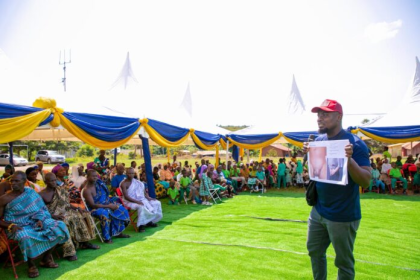The Supreme Court of Ghana has ruled that properties acquired during a marriage must be shared equitably after divorce, but not necessarily split into equal halves. In a landmark judgment, the court held that it is not every property acquired during marriage that can be presumed to be jointly owned by both spouses. Rather, the distribution must be guided by the principle of fairness, the evidence of contribution, and the peculiar facts of each case.
The justices made it clear that there is no constitutional mandate for a 50-50 split of assets after divorce if one party is unable to prove their contribution toward the acquisition of specific properties. “The law does not prescribe an automatic right to a fifty-percent share of property acquired during marriage,” the judgment declared. Describing the constitutional provision on property-sharing upon divorce, the justices noted: “The Constitution speaks of distribution that is equitable, not necessarily equal.” They added that the maxim “equality is equity” is not a rigid standard and must be applied cautiously, particularly in situations where one spouse cannot demonstrate their role in acquiring or maintaining the property.
The judgment stemmed from a divorce case between Mrs. Abena Pokua and her husband, Yaw Kwakye, who married under customary law in 1998. At the time of marriage, the husband was already married to other women—a fact known to Mrs. Pokua. Following the breakdown of the marriage, she petitioned the High Court to dissolve the union and to “divide all matrimonial properties” acquired during its subsistence. The wife listed more than 20 assets that she claimed were marital properties and, therefore, subject to equal division. These assets included multiple houses located in the Ashanti, Eastern, and Central regions, commercial buildings, a hotel at Konongo, vehicles, excavators, plantations, shops, plots of land, and even a gold-buying office.
The husband vehemently denied that these properties were jointly acquired. He asserted that most of them were either acquired before the marriage or were the result of his separate investments. He admitted only to a few assets, such as a house at Ajara in Kade, which he said he gifted to his wife. He also mentioned that he had supported her business financially and had renovated her family house in her hometown.
In May 2022, the High Court found that several of the properties listed by the wife were indeed acquired during the marriage. These included the Dabi Asem Hotel at Konongo, a house at Dr. Wood in Konongo, a house at Topreman near Akyem-Kade, an uncompleted house at Akyem Achiase, the storey building at Tipper Junction on the Bawjiase Road in Kasoa, six plots of land at Kweikuma in Kasoa, and one plot of land near the Tipper Junction. The court ruled that the hotel at Konongo should be divided equally between the spouses with an option for either party to buy out the other’s share. It also awarded the uncompleted house at Akyem Achiase and the storey building in Kasoa to the wife, and ordered the husband to pay her an additional GHC150,000 for relocation and settlement. The court further directed that the husband should cater for the health and education of the children, while the wife assumed responsibility for their feeding, clothing, and accommodation.
The husband appealed the High Court ruling. In July 2024, the Court of Appeal reversed most of the High Court’s findings. The appellate court held that the wife had failed to prove any financial or non-monetary contribution to a number of the key assets. It said that the parties operated separate businesses and had not pooled their resources to acquire the properties. The judges noted, for example, that the evidence showed the Dabi Asem Hotel at Konongo was acquired solely by the husband using his own funds, and that the house at Dr. Wood in Konongo was built for the benefit of another wife, not Mrs. Pokua. The court also dismissed her claim to the three excavators, stating that two of them were rentals, and there was no credible evidence that she contributed to the acquisition of any.
The Court of Appeal further held that while the wife might not have contributed to the acquisition of certain properties, she had been significantly supported by the husband during the marriage. It pointed out that he had given her a house in Ajara, renovated her family home in the Eastern Region, financed her gold business with GHC100,000, provided her a market store with goods valued at GHC200,000, and gifted her a vehicle. These, the court said, were sufficient provisions made in her favour, which the trial court had largely ignored.
In light of these findings, the Court of Appeal reduced the financial award to the wife from GHC150,000 to GHC100,000. It, however, upheld the order that the husband should continue to support the children’s education and healthcare needs, while the wife retained responsibility for their welfare within her custody.
Dissatisfied, the wife appealed to the Supreme Court. Her counsel argued that the Court of Appeal had erred in its reasoning and had unfairly minimized her entitlements. The wife’s main contentions included claims that the Court of Appeal had allowed a ground of appeal that the husband did not argue in his written submissions, that it had not duly complied with procedural rules, and that its overall judgment was against the weight of evidence.
The Supreme Court flatly rejected these claims and upheld the ruling of the Court of Appeal in full. “An appeal is by way of rehearing,” the court stressed, explaining that the appellate judges were within their jurisdiction to re-evaluate the evidence even if a ground of appeal was not separately argued, especially where it overlapped with other issues. The court said the wife could not complain of being treated unfairly when the record showed she had the opportunity to respond to all relevant arguments.
On the substantive legal issues, the Supreme Court took the opportunity to clarify Ghana’s matrimonial property law. It traced the jurisprudence from the landmark case of Mensah v Mensah to more recent decisions like Boafo v Boafo and Adjei v Adjei, showing how the courts have moved away from the simplistic rule that “property acquired during marriage is joint property and must be shared equally.” The judges placed new emphasis on Article 18(1) of the Constitution, which guarantees every person the right to own property individually, whether married or not.
“In line with Article 18(1), marriage does not strip a spouse of the right to independently acquire and enjoy property,” the court stated. It continued: “If the framers of the Constitution had intended that all property acquired during marriage be shared equally, they would have said so plainly.”
The justices also highlighted that the case involved a customary-law marriage which, by its nature, was factually polygamous. Under such circumstances, the court said, it would be improper and inequitable to distribute property as if the marriage were monogamous. “It will be most unreasonable,” the court cautioned, “for the wife to expect that whatever property was acquired during the marriage should be shared equally between herself and the husband without regard to other wives with potential interests.”
The court affirmed that the only properties to which the wife was entitled under equitable distribution principles were the uncompleted house at Akyem Achiase, the self-contained house at Ajara Junction in Kade, and a cash sum of GHC100,000. These, the court said, represented a fair settlement based on the established facts and the husband’s contributions to the wife’s welfare throughout the marriage.
In finally dismissing the appeal, the Supreme Court delivered a strong message to divorcing spouses and their counsel: property division is not about formulas or emotional expectations but about proven contribution, context, and fairness. “If ever there was any notion or impression of a mandatory fifty-fifty sharing of property acquired during marriage, let it be noted that the court has moved away from that impression,” the judgment declared.
For lawyers, litigants, and scholars, the decision reinforces a critical point: equity follows the facts. Where a spouse cannot prove contribution to the acquisition of property, either financially or through household efforts, there will be no automatic entitlement to a share. Property rights under Ghanaian law, the court insisted, must be interpreted in a manner that respects both personal effort and marital partnership, without unjustly enriching one party at the expense of the other.






